(新课标)Unit 1 Stay Healthy Lesson 5 Jane’s Lucky Life分层练习(含答案)
文档属性
| 名称 | (新课标)Unit 1 Stay Healthy Lesson 5 Jane’s Lucky Life分层练习(含答案) |
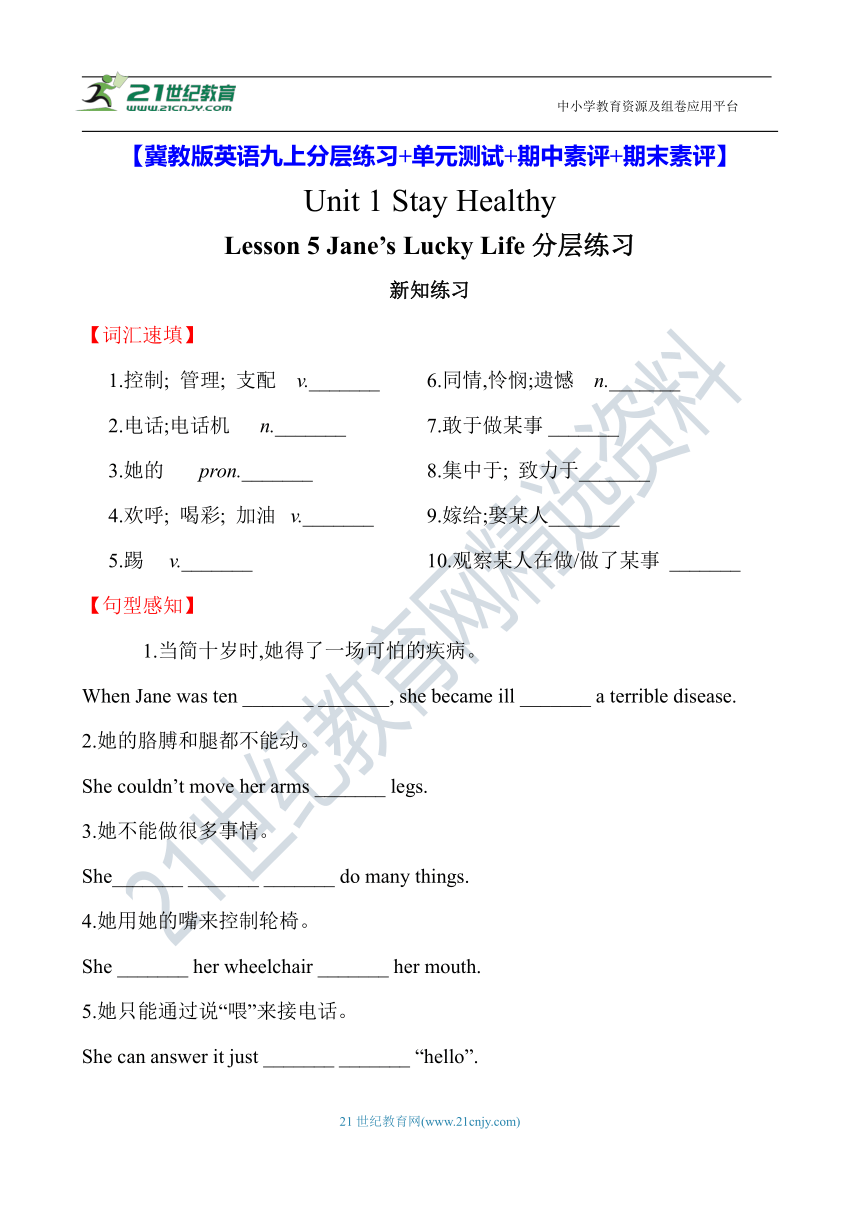
|
|
| 格式 | doc | ||
| 文件大小 | 1.7MB | ||
| 资源类型 | 试卷 | ||
| 版本资源 | 冀教版 | ||
| 科目 | 英语 | ||
| 更新时间 | 2022-07-30 00:00:00 | ||
图片预览

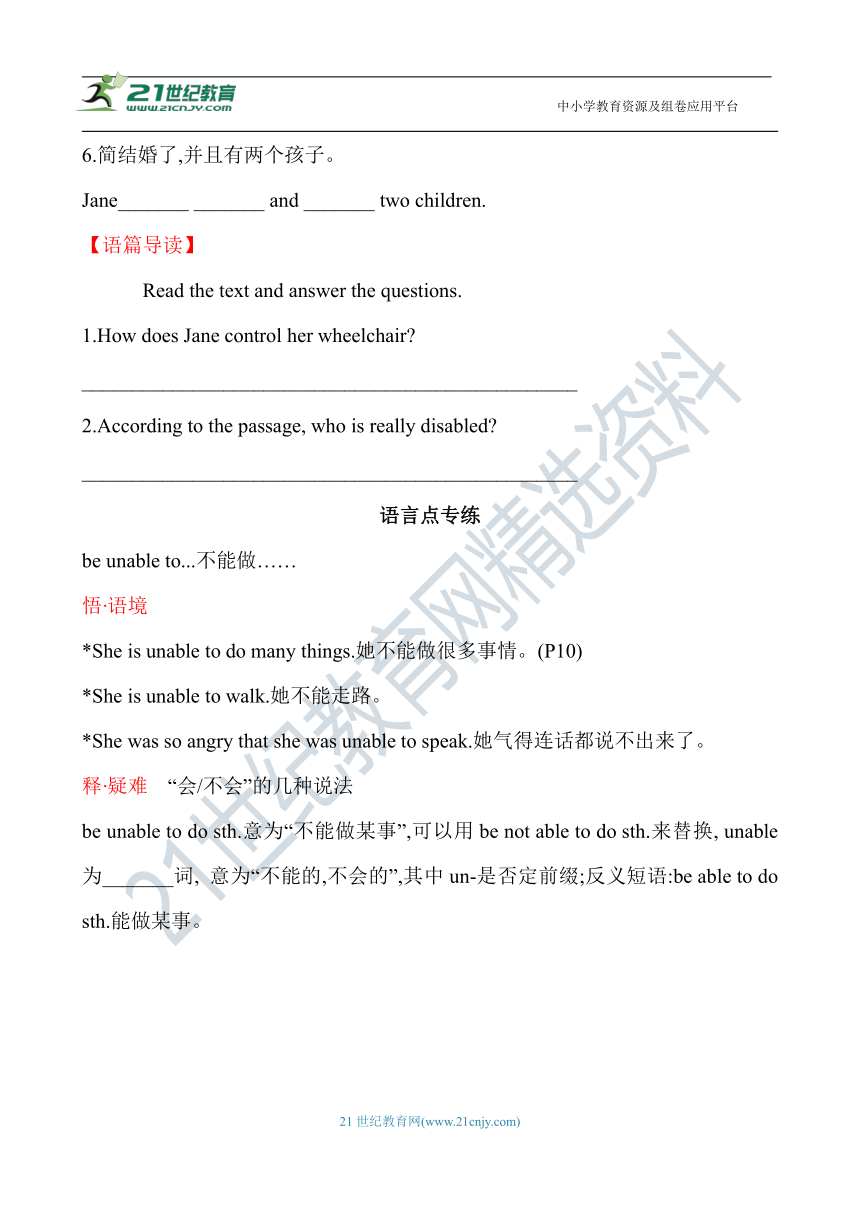
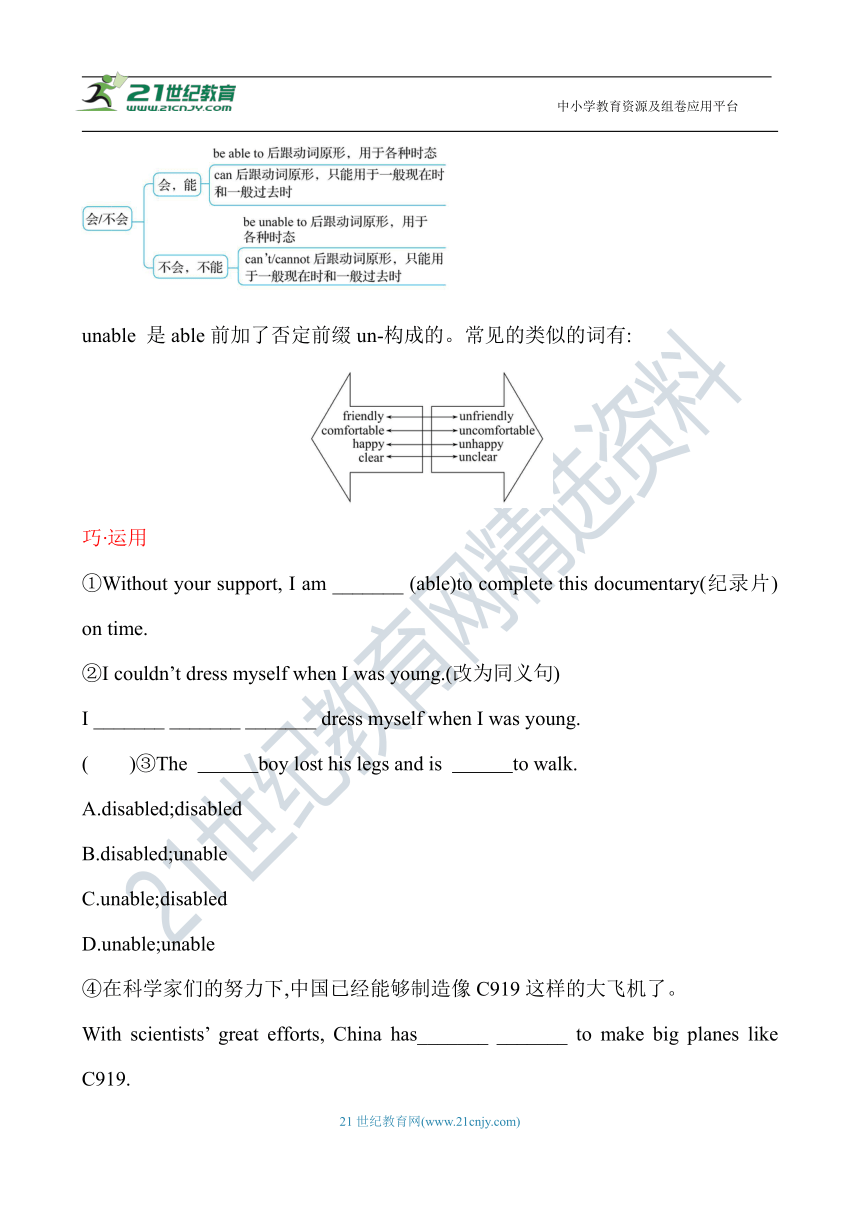
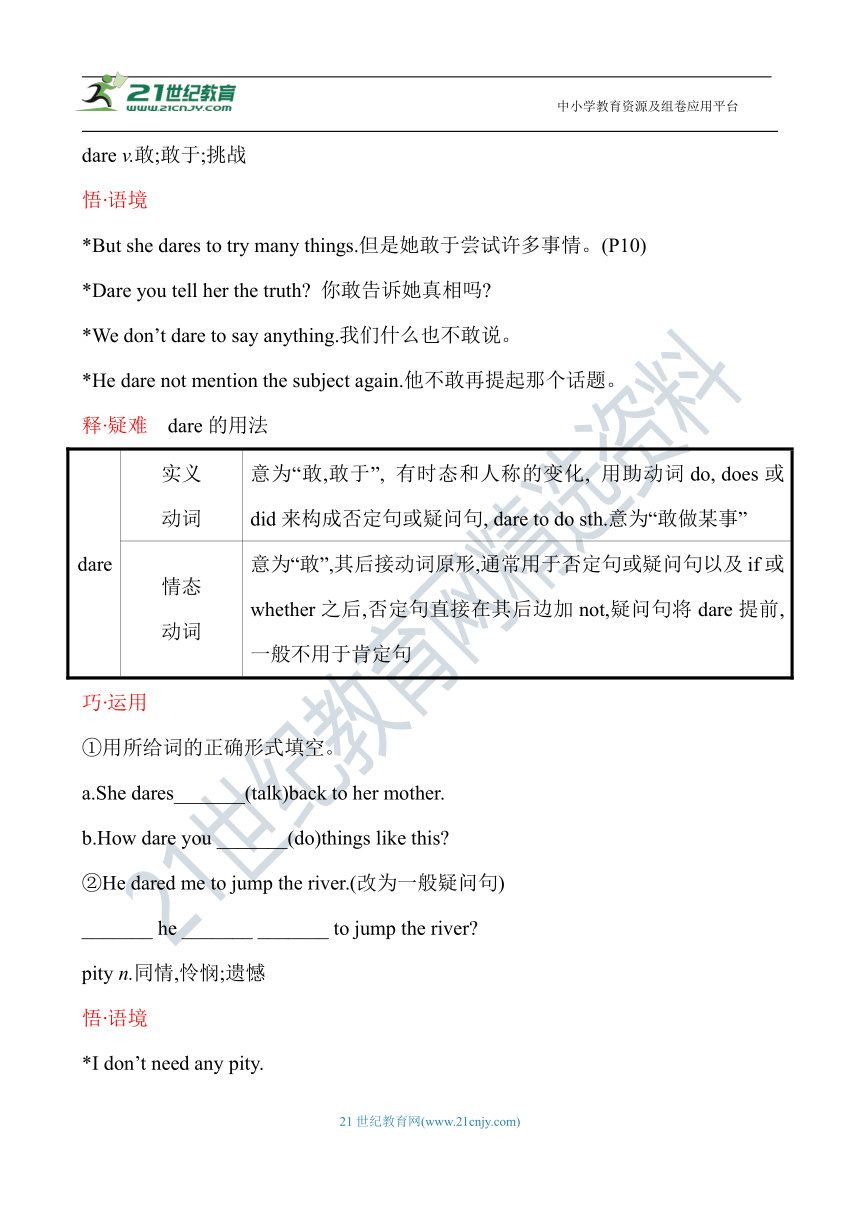
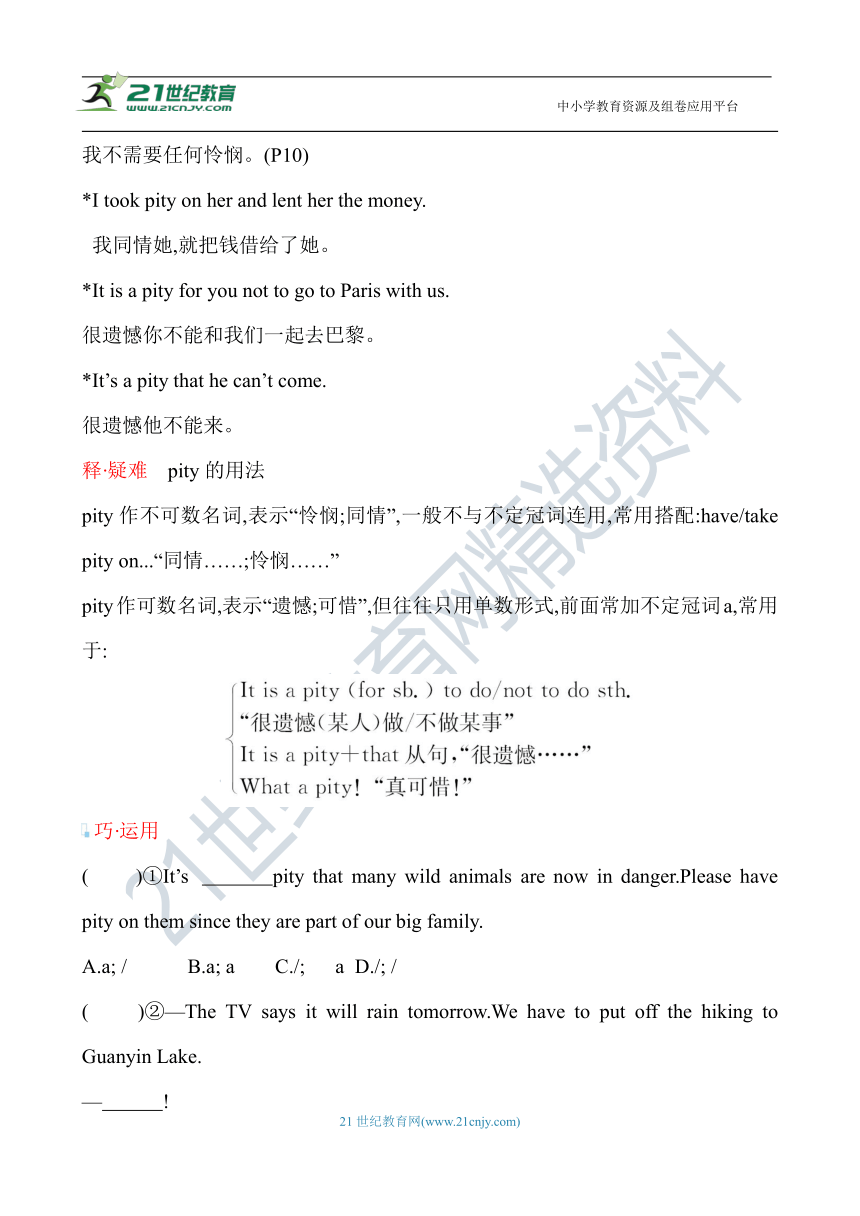
文档简介
中小学教育资源及组卷应用平台
【冀教版英语九上分层练习+单元测试+期中素评+期末素评】
Unit 1 Stay Healthy
Lesson 5 Jane’s Lucky Life分层练习
新知练习
【词汇速填】
1.控制; 管理; 支配 v._______2.电话;电话机 n._______3.她的 pron._______4.欢呼; 喝彩; 加油 v._______5.踢 v._______ 6.同情,怜悯;遗憾 n._______7.敢于做某事 _______8.集中于; 致力于_______9.嫁给;娶某人_______10.观察某人在做/做了某事 _______
【句型感知】
1.当简十岁时,她得了一场可怕的疾病。
When Jane was ten _______ _______, she became ill _______ a terrible disease.
2.她的胳膊和腿都不能动。
She couldn’t move her arms _______ legs.
3.她不能做很多事情。
She_______ _______ _______ do many things.
4.她用她的嘴来控制轮椅。
She _______ her wheelchair _______ her mouth.
5.她只能通过说“喂”来接电话。
She can answer it just _______ _______ “hello”.
6.简结婚了,并且有两个孩子。
Jane_______ _______ and _______ two children.
【语篇导读】
Read the text and answer the questions.
1.How does Jane control her wheelchair
_________________________________________________
2.According to the passage, who is really disabled
_________________________________________________
语言点专练
be unable to...不能做……
悟·语境
*She is unable to do many things.她不能做很多事情。(P10)
*She is unable to walk.她不能走路。
*She was so angry that she was unable to speak.她气得连话都说不出来了。
释·疑难 “会/不会”的几种说法
be unable to do sth.意为“不能做某事”,可以用be not able to do sth.来替换, unable为_______词, 意为“不能的,不会的”,其中un-是否定前缀;反义短语:be able to do sth.能做某事。
unable 是able前加了否定前缀un-构成的。常见的类似的词有:
巧·运用
①Without your support, I am _______ (able)to complete this documentary(纪录片) on time.
②I couldn’t dress myself when I was young.(改为同义句)
I _______ _______ _______ dress myself when I was young.
( )③The boy lost his legs and is to walk.
A.disabled;disabled
B.disabled;unable
C.unable;disabled
D.unable;unable
④在科学家们的努力下,中国已经能够制造像C919这样的大飞机了。
With scientists’ great efforts, China has_______ _______ to make big planes like C919.
dare v.敢;敢于;挑战
悟·语境
*But she dares to try many things.但是她敢于尝试许多事情。(P10)
*Dare you tell her the truth 你敢告诉她真相吗
*We don’t dare to say anything.我们什么也不敢说。
*He dare not mention the subject again.他不敢再提起那个话题。
释·疑难 dare的用法
dare 实义动词 意为“敢,敢于”, 有时态和人称的变化, 用助动词do, does或did来构成否定句或疑问句, dare to do sth.意为“敢做某事”
情态动词 意为“敢”,其后接动词原形,通常用于否定句或疑问句以及if或whether之后,否定句直接在其后边加not,疑问句将dare提前,一般不用于肯定句
巧·运用
①用所给词的正确形式填空。
a.She dares_______(talk)back to her mother.
b.How dare you _______(do)things like this
②He dared me to jump the river.(改为一般疑问句)
_______ he _______ _______ to jump the river
pity n.同情,怜悯;遗憾
悟·语境
*I don’t need any pity.
我不需要任何怜悯。(P10)
*I took pity on her and lent her the money.
我同情她,就把钱借给了她。
*It is a pity for you not to go to Paris with us.
很遗憾你不能和我们一起去巴黎。
*It’s a pity that he can’t come.
很遗憾他不能来。
释·疑难 pity的用法
pity作不可数名词,表示“怜悯;同情”,一般不与不定冠词连用,常用搭配:have/take pity on...“同情……;怜悯……”
pity作可数名词,表示“遗憾;可惜”,但往往只用单数形式,前面常加不定冠词a,常用于:
巧·运用
( )①It’s pity that many wild animals are now in danger.Please have pity on them since they are part of our big family.
A.a; / B.a; a C./; a D./; /
( )②—The TV says it will rain tomorrow.We have to put off the hiking to Guanyin Lake.
— !
A.What a pity B.No problem C.Never mind D.My pleasure
基础专练
一、用所给词的适当形式填空(每小题1分,共5分)
1.According to the story, if you have a high EQ, you can be good at_______ (control)your emotions(情绪).
2.My elder brother dares_______ (jump) down from the tall tree.
3.You can improve your English by _______(practice) reading every day.
4.The little boy was _______(able) to stand up after the accident.He was so sad!
5.We should do our best to help the_______(disable) people.
二、 单项选择(每小题1分,共5分)
( )1.—Uncle Lee, may I use your bike
—Sorry,mine is broken.You can ask your aunt for .
A.mine B.his C.hers
( )2.—Little Jenny looks unhappy today.
—Don’t worry.A box of chocolates will her .
A give;up B.wake;up
C.cheer;up D.pick;up
( )3.The boss is so serious that no one dares jokes on him.
A.play B.plays C.to play D.playing
( )4.My grandparents for over 60 years and they love each other very much.
A.have been married
B.got married
C.were married
D.have got married
( )5.— I missed the film HI,MOM.
— ! It is such a meaningful film that it is really worth seeing.
A.Take it easy B.Sounds great
C.Thank you D.What a pity
三、完成句子(每小题2分,共10分)
1.那个残疾人不能自己做事情。
That disabled person_______ _______ _______ do things by himself.
2.在学校我们应当集中精力学习。
We should _______ _______ our study at school.
3.我们会为你的成功喝彩的!
We’ll _______ _______ your success!
4.既然你忙,就让我给你做吧。
_______ _______ you are busy,let me do it for you.
5.为了保持健康,你应当多吃蔬菜。
You should eat more vegetables _______ _______ you could stay healthy.
素养专练
四、阅读理解(每小题7.5分,共30分)
Darrius was born with three fingers on his right hand and one on his left hand.He had to work hard to do things that were easy for others.Every time his classmates tried to help, he would say, “Thanks, but I can do it myself.” He learned to use the four fingers to do different things.
When Darrius was 10, he told his father that he liked piano(钢琴) music very much.“It’s too bad you can’t play,” his father said.But the boy took that as a challenge(挑战).“I will show people that I can,” he said to himself.
Months later, a neighbour gave him an old piano when she moved away.He taught himself to play the piano and practised for hours a day.
Darrius’s favourite piano music is River Flows in You by Yiruma, a Korean musician.It took Darrius a year to learn it.“I have to come up with my own way with only 4 fingers,” he said.When he succeeded, he felt so proud.Later he was lucky enough to play the music together with Yiruma at a famous concert hall! Yiruma encouraged Darrius to follow his dream of playing his own music.Darrius has made it.And his music is popular today.
“I may have a disability,” he says, “ but I don’t let it hold me back from anything.”
( )1.What did Darrius take as a challenge at the age of 10
A.Writing his music.
B.Playing the piano.
C.Giving a concert.
D.Visiting a hall.
( )2.How long did it take Darrius to learn to play River Flows in You
A.A year. B.A month. C.A day. D.An hour.
( )3.Who encouraged Darrius to follow his dream
A.His classmate. B.His father.
C.A neighbour. D.A musician.
( )4.What can we learn about Darrius from the text
A.He has a strong will.
B.He bought himself a piano.
C.He gave up his dream.
D.He only plays others’ music.
答案版
【词汇速填】
1.控制; 管理; 支配 v.control2.电话;电话机 n.telephone3.她的 pron.hers4.欢呼; 喝彩; 加油 v.cheer5.踢 v.kick 6.同情,怜悯;遗憾 n.pity7.敢于做某事 dare to do sth.8.集中于; 致力于 focus on9.嫁给;娶某人 marry sb.10.观察某人在做/做了某事 watch sb.doing/do sth.
【句型感知】
1.当简十岁时,她得了一场可怕的疾病。
When Jane was ten years old, she became ill with a terrible disease.
2.她的胳膊和腿都不能动。
She couldn’t move her arms or legs.
3.她不能做很多事情。
She is unable to do many things.
4.她用她的嘴来控制轮椅。
She controls her wheelchair with her mouth.
5.她只能通过说“喂”来接电话。
She can answer it just by saying “hello”.
6.简结婚了,并且有两个孩子。
Jane is married and has two children.
【语篇导读】
Read the text and answer the questions.
1.How does Jane control her wheelchair
She controls her wheelchair with her mouth.
2.According to the passage, who is really disabled
People who don’t know how lucky they are.
语言点专练
be unable to...不能做……
悟·语境
*She is unable to do many things.她不能做很多事情。(P10)
*She is unable to walk.她不能走路。
*She was so angry that she was unable to speak.她气得连话都说不出来了。
释·疑难 “会/不会”的几种说法
be unable to do sth.意为“不能做某事”,可以用be not able to do sth.来替换, unable为形容词, 意为“不能的,不会的”,其中un-是否定前缀;反义短语:be able to do sth.能做某事。
unable 是able前加了否定前缀un-构成的。常见的类似的词有:
巧·运用
①Without your support, I am unable (able)to complete this documentary(纪录片) on time.
②I couldn’t dress myself when I was young.(改为同义句)
I was unable to dress myself when I was young.
( B )③The boy lost his legs and is to walk.
A.disabled;disabled
B.disabled;unable
C.unable;disabled
D.unable;unable
④在科学家们的努力下,中国已经能够制造像C919这样的大飞机了。
With scientists’ great efforts, China has been able to make big planes like C919.
dare v.敢;敢于;挑战
悟·语境
*But she dares to try many things.但是她敢于尝试许多事情。(P10)
*Dare you tell her the truth 你敢告诉她真相吗
*We don’t dare to say anything.我们什么也不敢说。
*He dare not mention the subject again.他不敢再提起那个话题。
释·疑难 dare的用法
dare 实义动词 意为“敢,敢于”, 有时态和人称的变化, 用助动词do, does或did来构成否定句或疑问句, dare to do sth.意为“敢做某事”
情态动词 意为“敢”,其后接动词原形,通常用于否定句或疑问句以及if或whether之后,否定句直接在其后边加not,疑问句将dare提前,一般不用于肯定句
巧·运用
①用所给词的正确形式填空。
a.She dares to talk(talk)back to her mother.
b.How dare you do(do)things like this
②He dared me to jump the river.(改为一般疑问句)
Did he dare you to jump the river
pity n.同情,怜悯;遗憾
悟·语境
*I don’t need any pity.
我不需要任何怜悯。(P10)
*I took pity on her and lent her the money.
我同情她,就把钱借给了她。
*It is a pity for you not to go to Paris with us.
很遗憾你不能和我们一起去巴黎。
*It’s a pity that he can’t come.
很遗憾他不能来。
释·疑难 pity的用法
pity作不可数名词,表示“怜悯;同情”,一般不与不定冠词连用,常用搭配:have/take pity on...“同情……;怜悯……”
pity作可数名词,表示“遗憾;可惜”,但往往只用单数形式,前面常加不定冠词a,常用于:
巧·运用
( A )①It’s pity that many wild animals are now in danger.Please have pity on them since they are part of our big family.
A.a; / B.a; a C./; a D./; /
( A )②—The TV says it will rain tomorrow.We have to put off the hiking to Guanyin Lake.
— !
A.What a pity B.No problem
C.Never mind D.My pleasure
基础专练
一、用所给词的适当形式填空(每小题1分,共5分)
1.According to the story, if you have a high EQ, you can be good at controlling (control)your emotions(情绪).
2.My elder brother dares to jump (jump) down from the tall tree.
3.You can improve your English by practicing(practice) reading every day.
4.The little boy was unable(able) to stand up after the accident.He was so sad!
5.We should do our best to help the disabled(disable) people.
二、 单项选择(每小题1分,共5分)
( C )1.—Uncle Lee, may I use your bike
—Sorry,mine is broken.You can ask your aunt for .
A.mine B.his C.hers
( C )2.—Little Jenny looks unhappy today.
—Don’t worry.A box of chocolates will her .
A give;up B.wake;up
C.cheer;up D.pick;up
( C )3.The boss is so serious that no one dares jokes on him.
A.play B.plays
C.to play D.playing
( A )4.My grandparents for over 60 years and they love each other very much.
A.have been married
B.got married
C.were married
D.have got married
( D )5.— I missed the film HI,MOM.
— ! It is such a meaningful film that it is really worth seeing.
A.Take it easy B.Sounds great
C.Thank you D.What a pity
三、完成句子(每小题2分,共10分)
1.那个残疾人不能自己做事情。
That disabled person is unable to do things by himself.
2.在学校我们应当集中精力学习。
We should focus on our study at school.
3.我们会为你的成功喝彩的!
We’ll cheer for your success!
4.既然你忙,就让我给你做吧。
Now that you are busy,let me do it for you.
5.为了保持健康,你应当多吃蔬菜。
You should eat more vegetables so that you could stay healthy.
素养专练
四、阅读理解(每小题7.5分,共30分)
Darrius was born with three fingers on his right hand and one on his left hand.He had to work hard to do things that were easy for others.Every time his classmates tried to help, he would say, “Thanks, but I can do it myself.” He learned to use the four fingers to do different things.
When Darrius was 10, he told his father that he liked piano(钢琴) music very much.“It’s too bad you can’t play,” his father said.But the boy took that as a challenge(挑战).“I will show people that I can,” he said to himself.
Months later, a neighbour gave him an old piano when she moved away.He taught himself to play the piano and practised for hours a day.
Darrius’s favourite piano music is River Flows in You by Yiruma, a Korean musician.It took Darrius a year to learn it.“I have to come up with my own way with only 4 fingers,” he said.When he succeeded, he felt so proud.Later he was lucky enough to play the music together with Yiruma at a famous concert hall! Yiruma encouraged Darrius to follow his dream of playing his own music.Darrius has made it.And his music is popular today.
“I may have a disability,” he says, “ but I don’t let it hold me back from anything.”
( B )1.What did Darrius take as a challenge at the age of 10
A.Writing his music.
B.Playing the piano.
C.Giving a concert.
D.Visiting a hall.
( A )2.How long did it take Darrius to learn to play River Flows in You
A.A year. B.A month.
C.A day. D.An hour.
( D )3.Who encouraged Darrius to follow his dream
A.His classmate. B.His father.
C.A neighbour. D.A musician.
( A )4.What can we learn about Darrius from the text
A.He has a strong will.
B.He bought himself a piano.
C.He gave up his dream.
D.He only plays others’ music.
PAGE
HYPERLINK "http://21世纪教育网(www.21cnjy.com)
" 21世纪教育网(www.21cnjy.com)
【冀教版英语九上分层练习+单元测试+期中素评+期末素评】
Unit 1 Stay Healthy
Lesson 5 Jane’s Lucky Life分层练习
新知练习
【词汇速填】
1.控制; 管理; 支配 v._______2.电话;电话机 n._______3.她的 pron._______4.欢呼; 喝彩; 加油 v._______5.踢 v._______ 6.同情,怜悯;遗憾 n._______7.敢于做某事 _______8.集中于; 致力于_______9.嫁给;娶某人_______10.观察某人在做/做了某事 _______
【句型感知】
1.当简十岁时,她得了一场可怕的疾病。
When Jane was ten _______ _______, she became ill _______ a terrible disease.
2.她的胳膊和腿都不能动。
She couldn’t move her arms _______ legs.
3.她不能做很多事情。
She_______ _______ _______ do many things.
4.她用她的嘴来控制轮椅。
She _______ her wheelchair _______ her mouth.
5.她只能通过说“喂”来接电话。
She can answer it just _______ _______ “hello”.
6.简结婚了,并且有两个孩子。
Jane_______ _______ and _______ two children.
【语篇导读】
Read the text and answer the questions.
1.How does Jane control her wheelchair
_________________________________________________
2.According to the passage, who is really disabled
_________________________________________________
语言点专练
be unable to...不能做……
悟·语境
*She is unable to do many things.她不能做很多事情。(P10)
*She is unable to walk.她不能走路。
*She was so angry that she was unable to speak.她气得连话都说不出来了。
释·疑难 “会/不会”的几种说法
be unable to do sth.意为“不能做某事”,可以用be not able to do sth.来替换, unable为_______词, 意为“不能的,不会的”,其中un-是否定前缀;反义短语:be able to do sth.能做某事。
unable 是able前加了否定前缀un-构成的。常见的类似的词有:
巧·运用
①Without your support, I am _______ (able)to complete this documentary(纪录片) on time.
②I couldn’t dress myself when I was young.(改为同义句)
I _______ _______ _______ dress myself when I was young.
( )③The boy lost his legs and is to walk.
A.disabled;disabled
B.disabled;unable
C.unable;disabled
D.unable;unable
④在科学家们的努力下,中国已经能够制造像C919这样的大飞机了。
With scientists’ great efforts, China has_______ _______ to make big planes like C919.
dare v.敢;敢于;挑战
悟·语境
*But she dares to try many things.但是她敢于尝试许多事情。(P10)
*Dare you tell her the truth 你敢告诉她真相吗
*We don’t dare to say anything.我们什么也不敢说。
*He dare not mention the subject again.他不敢再提起那个话题。
释·疑难 dare的用法
dare 实义动词 意为“敢,敢于”, 有时态和人称的变化, 用助动词do, does或did来构成否定句或疑问句, dare to do sth.意为“敢做某事”
情态动词 意为“敢”,其后接动词原形,通常用于否定句或疑问句以及if或whether之后,否定句直接在其后边加not,疑问句将dare提前,一般不用于肯定句
巧·运用
①用所给词的正确形式填空。
a.She dares_______(talk)back to her mother.
b.How dare you _______(do)things like this
②He dared me to jump the river.(改为一般疑问句)
_______ he _______ _______ to jump the river
pity n.同情,怜悯;遗憾
悟·语境
*I don’t need any pity.
我不需要任何怜悯。(P10)
*I took pity on her and lent her the money.
我同情她,就把钱借给了她。
*It is a pity for you not to go to Paris with us.
很遗憾你不能和我们一起去巴黎。
*It’s a pity that he can’t come.
很遗憾他不能来。
释·疑难 pity的用法
pity作不可数名词,表示“怜悯;同情”,一般不与不定冠词连用,常用搭配:have/take pity on...“同情……;怜悯……”
pity作可数名词,表示“遗憾;可惜”,但往往只用单数形式,前面常加不定冠词a,常用于:
巧·运用
( )①It’s pity that many wild animals are now in danger.Please have pity on them since they are part of our big family.
A.a; / B.a; a C./; a D./; /
( )②—The TV says it will rain tomorrow.We have to put off the hiking to Guanyin Lake.
— !
A.What a pity B.No problem C.Never mind D.My pleasure
基础专练
一、用所给词的适当形式填空(每小题1分,共5分)
1.According to the story, if you have a high EQ, you can be good at_______ (control)your emotions(情绪).
2.My elder brother dares_______ (jump) down from the tall tree.
3.You can improve your English by _______(practice) reading every day.
4.The little boy was _______(able) to stand up after the accident.He was so sad!
5.We should do our best to help the_______(disable) people.
二、 单项选择(每小题1分,共5分)
( )1.—Uncle Lee, may I use your bike
—Sorry,mine is broken.You can ask your aunt for .
A.mine B.his C.hers
( )2.—Little Jenny looks unhappy today.
—Don’t worry.A box of chocolates will her .
A give;up B.wake;up
C.cheer;up D.pick;up
( )3.The boss is so serious that no one dares jokes on him.
A.play B.plays C.to play D.playing
( )4.My grandparents for over 60 years and they love each other very much.
A.have been married
B.got married
C.were married
D.have got married
( )5.— I missed the film HI,MOM.
— ! It is such a meaningful film that it is really worth seeing.
A.Take it easy B.Sounds great
C.Thank you D.What a pity
三、完成句子(每小题2分,共10分)
1.那个残疾人不能自己做事情。
That disabled person_______ _______ _______ do things by himself.
2.在学校我们应当集中精力学习。
We should _______ _______ our study at school.
3.我们会为你的成功喝彩的!
We’ll _______ _______ your success!
4.既然你忙,就让我给你做吧。
_______ _______ you are busy,let me do it for you.
5.为了保持健康,你应当多吃蔬菜。
You should eat more vegetables _______ _______ you could stay healthy.
素养专练
四、阅读理解(每小题7.5分,共30分)
Darrius was born with three fingers on his right hand and one on his left hand.He had to work hard to do things that were easy for others.Every time his classmates tried to help, he would say, “Thanks, but I can do it myself.” He learned to use the four fingers to do different things.
When Darrius was 10, he told his father that he liked piano(钢琴) music very much.“It’s too bad you can’t play,” his father said.But the boy took that as a challenge(挑战).“I will show people that I can,” he said to himself.
Months later, a neighbour gave him an old piano when she moved away.He taught himself to play the piano and practised for hours a day.
Darrius’s favourite piano music is River Flows in You by Yiruma, a Korean musician.It took Darrius a year to learn it.“I have to come up with my own way with only 4 fingers,” he said.When he succeeded, he felt so proud.Later he was lucky enough to play the music together with Yiruma at a famous concert hall! Yiruma encouraged Darrius to follow his dream of playing his own music.Darrius has made it.And his music is popular today.
“I may have a disability,” he says, “ but I don’t let it hold me back from anything.”
( )1.What did Darrius take as a challenge at the age of 10
A.Writing his music.
B.Playing the piano.
C.Giving a concert.
D.Visiting a hall.
( )2.How long did it take Darrius to learn to play River Flows in You
A.A year. B.A month. C.A day. D.An hour.
( )3.Who encouraged Darrius to follow his dream
A.His classmate. B.His father.
C.A neighbour. D.A musician.
( )4.What can we learn about Darrius from the text
A.He has a strong will.
B.He bought himself a piano.
C.He gave up his dream.
D.He only plays others’ music.
答案版
【词汇速填】
1.控制; 管理; 支配 v.control2.电话;电话机 n.telephone3.她的 pron.hers4.欢呼; 喝彩; 加油 v.cheer5.踢 v.kick 6.同情,怜悯;遗憾 n.pity7.敢于做某事 dare to do sth.8.集中于; 致力于 focus on9.嫁给;娶某人 marry sb.10.观察某人在做/做了某事 watch sb.doing/do sth.
【句型感知】
1.当简十岁时,她得了一场可怕的疾病。
When Jane was ten years old, she became ill with a terrible disease.
2.她的胳膊和腿都不能动。
She couldn’t move her arms or legs.
3.她不能做很多事情。
She is unable to do many things.
4.她用她的嘴来控制轮椅。
She controls her wheelchair with her mouth.
5.她只能通过说“喂”来接电话。
She can answer it just by saying “hello”.
6.简结婚了,并且有两个孩子。
Jane is married and has two children.
【语篇导读】
Read the text and answer the questions.
1.How does Jane control her wheelchair
She controls her wheelchair with her mouth.
2.According to the passage, who is really disabled
People who don’t know how lucky they are.
语言点专练
be unable to...不能做……
悟·语境
*She is unable to do many things.她不能做很多事情。(P10)
*She is unable to walk.她不能走路。
*She was so angry that she was unable to speak.她气得连话都说不出来了。
释·疑难 “会/不会”的几种说法
be unable to do sth.意为“不能做某事”,可以用be not able to do sth.来替换, unable为形容词, 意为“不能的,不会的”,其中un-是否定前缀;反义短语:be able to do sth.能做某事。
unable 是able前加了否定前缀un-构成的。常见的类似的词有:
巧·运用
①Without your support, I am unable (able)to complete this documentary(纪录片) on time.
②I couldn’t dress myself when I was young.(改为同义句)
I was unable to dress myself when I was young.
( B )③The boy lost his legs and is to walk.
A.disabled;disabled
B.disabled;unable
C.unable;disabled
D.unable;unable
④在科学家们的努力下,中国已经能够制造像C919这样的大飞机了。
With scientists’ great efforts, China has been able to make big planes like C919.
dare v.敢;敢于;挑战
悟·语境
*But she dares to try many things.但是她敢于尝试许多事情。(P10)
*Dare you tell her the truth 你敢告诉她真相吗
*We don’t dare to say anything.我们什么也不敢说。
*He dare not mention the subject again.他不敢再提起那个话题。
释·疑难 dare的用法
dare 实义动词 意为“敢,敢于”, 有时态和人称的变化, 用助动词do, does或did来构成否定句或疑问句, dare to do sth.意为“敢做某事”
情态动词 意为“敢”,其后接动词原形,通常用于否定句或疑问句以及if或whether之后,否定句直接在其后边加not,疑问句将dare提前,一般不用于肯定句
巧·运用
①用所给词的正确形式填空。
a.She dares to talk(talk)back to her mother.
b.How dare you do(do)things like this
②He dared me to jump the river.(改为一般疑问句)
Did he dare you to jump the river
pity n.同情,怜悯;遗憾
悟·语境
*I don’t need any pity.
我不需要任何怜悯。(P10)
*I took pity on her and lent her the money.
我同情她,就把钱借给了她。
*It is a pity for you not to go to Paris with us.
很遗憾你不能和我们一起去巴黎。
*It’s a pity that he can’t come.
很遗憾他不能来。
释·疑难 pity的用法
pity作不可数名词,表示“怜悯;同情”,一般不与不定冠词连用,常用搭配:have/take pity on...“同情……;怜悯……”
pity作可数名词,表示“遗憾;可惜”,但往往只用单数形式,前面常加不定冠词a,常用于:
巧·运用
( A )①It’s pity that many wild animals are now in danger.Please have pity on them since they are part of our big family.
A.a; / B.a; a C./; a D./; /
( A )②—The TV says it will rain tomorrow.We have to put off the hiking to Guanyin Lake.
— !
A.What a pity B.No problem
C.Never mind D.My pleasure
基础专练
一、用所给词的适当形式填空(每小题1分,共5分)
1.According to the story, if you have a high EQ, you can be good at controlling (control)your emotions(情绪).
2.My elder brother dares to jump (jump) down from the tall tree.
3.You can improve your English by practicing(practice) reading every day.
4.The little boy was unable(able) to stand up after the accident.He was so sad!
5.We should do our best to help the disabled(disable) people.
二、 单项选择(每小题1分,共5分)
( C )1.—Uncle Lee, may I use your bike
—Sorry,mine is broken.You can ask your aunt for .
A.mine B.his C.hers
( C )2.—Little Jenny looks unhappy today.
—Don’t worry.A box of chocolates will her .
A give;up B.wake;up
C.cheer;up D.pick;up
( C )3.The boss is so serious that no one dares jokes on him.
A.play B.plays
C.to play D.playing
( A )4.My grandparents for over 60 years and they love each other very much.
A.have been married
B.got married
C.were married
D.have got married
( D )5.— I missed the film HI,MOM.
— ! It is such a meaningful film that it is really worth seeing.
A.Take it easy B.Sounds great
C.Thank you D.What a pity
三、完成句子(每小题2分,共10分)
1.那个残疾人不能自己做事情。
That disabled person is unable to do things by himself.
2.在学校我们应当集中精力学习。
We should focus on our study at school.
3.我们会为你的成功喝彩的!
We’ll cheer for your success!
4.既然你忙,就让我给你做吧。
Now that you are busy,let me do it for you.
5.为了保持健康,你应当多吃蔬菜。
You should eat more vegetables so that you could stay healthy.
素养专练
四、阅读理解(每小题7.5分,共30分)
Darrius was born with three fingers on his right hand and one on his left hand.He had to work hard to do things that were easy for others.Every time his classmates tried to help, he would say, “Thanks, but I can do it myself.” He learned to use the four fingers to do different things.
When Darrius was 10, he told his father that he liked piano(钢琴) music very much.“It’s too bad you can’t play,” his father said.But the boy took that as a challenge(挑战).“I will show people that I can,” he said to himself.
Months later, a neighbour gave him an old piano when she moved away.He taught himself to play the piano and practised for hours a day.
Darrius’s favourite piano music is River Flows in You by Yiruma, a Korean musician.It took Darrius a year to learn it.“I have to come up with my own way with only 4 fingers,” he said.When he succeeded, he felt so proud.Later he was lucky enough to play the music together with Yiruma at a famous concert hall! Yiruma encouraged Darrius to follow his dream of playing his own music.Darrius has made it.And his music is popular today.
“I may have a disability,” he says, “ but I don’t let it hold me back from anything.”
( B )1.What did Darrius take as a challenge at the age of 10
A.Writing his music.
B.Playing the piano.
C.Giving a concert.
D.Visiting a hall.
( A )2.How long did it take Darrius to learn to play River Flows in You
A.A year. B.A month.
C.A day. D.An hour.
( D )3.Who encouraged Darrius to follow his dream
A.His classmate. B.His father.
C.A neighbour. D.A musician.
( A )4.What can we learn about Darrius from the text
A.He has a strong will.
B.He bought himself a piano.
C.He gave up his dream.
D.He only plays others’ music.
PAGE
HYPERLINK "http://21世纪教育网(www.21cnjy.com)
" 21世纪教育网(www.21cnjy.com)
同课章节目录
- Unit 1 Stay Healthy
- Lesson 1 What's Wrong,Danny?
- Lesson 2 A Visit to the Dentist
- Lesson 3 Good Food, Good Health
- Lesson 4 Don't Smoke, Please!
- Lesson 5 Jane's Lucky Life
- Lesson 6 Stay Away from the Hospital
- Unit Review
- Unit 2 Great People
- Lesson 7 What Is the Meaning of Lift?
- Lesson 8 A Universe of Thought
- Lesson 9 China's Most Famous "Farmer"
- Lesson 10 Touch the World
- Lesson 11 To China, with Love
- Lesson 12 Guess My Hero!
- Unit Review
- Unit 3 Safety
- Lesson 13 Be Careful,Danny!
- Lesson 14 Accidents Happen
- Lesson 15 My Helmet Saved My Life!
- Lesson 16 How Safe Is Your Home?
- Lesson 17 Staying Safe in an Earthquake
- Lesson 18 Never Catch a Dinosaur
- Unit Review
- Unit 4 Stories and poems
- Lesson 19 A Story or a Poem?
- Lesson 20 Say It in Five
- Lesson 21 The Fable of the Woodcutte
- Lesson 22 The Giant(Ⅰ)
- Lesson 23 The Giant(Ⅱ)
- Lesson 24 Writing a Poem
- Unit Review
- Unit 5 Look into Science
- Lesson 25 Let's Do an Experiment!
- Lesson 26 Keep the Candle Burning
- Lesson 27 Planet Danny
- Lesson 28 The Study of Living Things
- Lesson 29 DNA—The Story of You
- Lesson 30 Science Affects Us
- Unit Review
- Unit 6 Movies and Theate
- Lesson 31 A movie or a Play
- Lesson 32 Moving Pictures
- Lesson 33 The Fisherman and the Goldfish(Ⅰ)
- Lesson 34 The Fisherman and the Goldfish(Ⅱ)
- Lesson 35 Theatres Are Fun!
- Lesson 36 Making Plays Is Fun
- Unit Review
